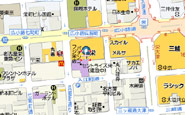 Not only some web articles related to health food in the West, but also ones in Asia such as HongKong,
Taiwan and India, frequently say things, for example, "Japanese live long due to their diet. We strongly recommend the adoption of Japanese-style food." I wonder how people interpret this, reading such articles. Some might often visit JapanTown and eat "ramen (Japanese-style noodles in soup)," "beef bowl," "pork cutlet bowl" or "tempura" (cooked with easily-oxidizable oil) as a daily lunch or dinner special, proudly saying "I'm kind of into Japanese food now. I feel so healthy." If you have friends announcing that sort of thing, please let them know that they misunderstand the "Japanese-style diet." I, myself, must admit that I love to eat this kind of B-grade cuisine once in awhile. However, if I ate them everyday, I would definitely be among the people with a high level of cholesterol in their blood quite soon. These meals can be enjoyed occasionally.
Not only some web articles related to health food in the West, but also ones in Asia such as HongKong,
Taiwan and India, frequently say things, for example, "Japanese live long due to their diet. We strongly recommend the adoption of Japanese-style food." I wonder how people interpret this, reading such articles. Some might often visit JapanTown and eat "ramen (Japanese-style noodles in soup)," "beef bowl," "pork cutlet bowl" or "tempura" (cooked with easily-oxidizable oil) as a daily lunch or dinner special, proudly saying "I'm kind of into Japanese food now. I feel so healthy." If you have friends announcing that sort of thing, please let them know that they misunderstand the "Japanese-style diet." I, myself, must admit that I love to eat this kind of B-grade cuisine once in awhile. However, if I ate them everyday, I would definitely be among the people with a high level of cholesterol in their blood quite soon. These meals can be enjoyed occasionally. Then, what is the "Japanese-style food" recommended in such web articles? Some typical healthy Japanese foodstuffs include the following:
Miso, tofu, seaweed, Japanese mushrooms, soba noodles (made from buckwheat flour), Japanese sardines, rice-bran pickles, bancha (Japanese tea with less caffeine), natto (fermented soybeans), perilla oil, shio-koji (salted rice malt), umeboshi (pickled plum), genmai (brown rice), and so on.
Some enthusiastic specialists on Japanese food may go to convince you by saying, for example, "You can pick up a new dietary habit in a few months. For your health, go all out eating Japanese food!" In this case, I believe that most people would not be able to stick to the new dietary habit because it is quite hard to adopt food which you have never tried before, not to speak of food from overseas. If you were truly able to maintain a Japanese diet, that would entail your having been born and lived in ancient Japan in your former life. In my opinion, when you force yourself to eat the food recommended and are still not sure whether you can keep taking it in the future, I wonder if your body could properly absorb the nutrients. Moreover, most habits strongly recommended by others, you will not be able to maintain in the end. If you take an interest in a particular food on your own, out of pure interest, then you will naturally put into practice a new way. In this case, your new diet will be sustainable.
Thus we would like to suggest that you try some healthy foodstuffs including Japanese food little by little and see how you actually feel. For example, consuming well-balanced (saturated and unsaturated) oils is considered to be indispensable to the prevention of lifestyle diseases. Instead of the usual buttery soup, you can try miso soup with a tablespoon of perilla oil (rich in polyunsaturated fatty acids) for a change. For those readers who tend to eat much saturated fats due to frequent eating out, we suggest that you use cooking oil high in oleic acid such as olive oil and rapeseed oil at home. In addition, consuming healthy protein, food with less sugar, and no chemical seasoning makes you much healthier. For instance, tofu cut into cubes can be used as a replacement for cheese salad topping. You can also look for bread made of graham flour as a substitute for white bread containing plenty of white sugar which you unknowingly buy for breakfast. Needless to say, we do not recommend cooking with MSG because it deceives you and makes you think your meals are tasty and nutritious. Shio-koji (salted rice malt) which incorporates a great number of enzymes and nearly twenty natural amino acids (umami ingredients) is recognized to be a healthy and useful seasoning in Japan. Its enzymes make chicken, fish, or vegetables much tenderer, and also umami ingredients draw out the flavor of foodstuffs. Hence, we hope for a boom in which more people daily come to use the salted rice malt in place of the chemical seasoning all over the world. Perhaps you sometimes cannot help having fast food such as hamburgers or fried chicken especially under your busy circumstances, but knowing *"tasty yet healthy diet alternatives" and sweetening foods up step by step is essential to the preservation of your health.
Next what we would like you to try is "NSY". It is very ordinary and simple yet hard to control. NSY stands for "Never stuff yourself." This keeps you younger and healthier. In fact, recent studies have shown that calorie restriction is closely linked to a long lifespan. It is said that reducing calories by 15 percent efficiently activates the longevity gene, the so-called "sirtuin" gene, which is considered to be related to "the anti-aging clue." Since the genetic study of aging is a relatively immature field, we look forward to further research on the sirtuin gene. Nevertheless, calorie restriction is believed to be the surest means of anti-aging in the field of biology despite various studies on extending lifespan. It is highly expected to reduce your weight, high blood pressure, high blood sugar, and cholesterol levels, which are risk factors for lifestyle-related diseases such as diabetes or heart disease.
Finally, we would like you to check out your stool as a barometer to learn your physical condition. How was its color, shape, size, smell, and consistency this morning? If it was light brown, shaped like a banana, not an irritable bowel movement, and did not have an extremely unpleasant odor, you can be sure that most probably you are in good shape and running full throttle all day long. As what you’d had for dinner before the morning in which you excreted the good stool is regarded as a suitable food for your body, it is a good idea to note the meals you usually have. In my case, I had miso soup with a plenty of roughly chopped cabbage, and home-made rice-bran pickles the other night and dropped "a really good one" next morning.
In conclusion, if you are the one who has started having an interest in healthy eating or feeling like giving up due to the unusual taste of the dishes, we would like you to remember that there are many and varied good-tasting, healthy recipes and meals you have not encountered yet. Do not think you must acquire healthy eating habits instantly. When you face a food that you have never tasted or that has a peculiar appearance, your brain tries to guess how it tastes. Depending on the guess, food prejudice is apt to occur. Therefore, finding out the enjoyment in a trial of various good foodstuffs at your own pace can be the key to the solution of this problem because your rich experience in food will be linked to the growth of your sense of taste, and then you will be able to obtain a new way to develop your own diet. Additionally, please keep "NSY" in mind. On the TV program (introducing a unique sense of food) **Takeshi Kitano, a popular figure on Japanese TV, recently mentioned such things . " People work hard and many of them choose to enjoy eating their favorite food as much as they like as a reward. Later they suffer from disease because of what they eat..... Is there any way to know just the right number of calories they should consume (e.g., by some sensory organs), while eating? " Unfortunately, we do not have such advanced organs, even so the human body is still able to tell you what sort of food is good or bad for you. For instance, your stool indicates how good your health is. As a result of your new diet, you will perceive yourself enjoying good health, which in turn leads to the maintenance of your healthy diet.
* You can refer to Youtube as it introduces various "Japanese food recipes".
** Takeshi Kitano is also known as a regular stand-up comedian, programme host, and a world-famous movie director.
Discover the pleasure of healthy dietary habits. It will lead to the preservation of your health.
5 April 2012 by A. ITO, Nagoya Natural Food Center K.K.



464-0836
1-9 Kikusaka-cho Chikusa-ku Nagoya, Aichi JAPAN
Tel.+81-52-762-0333
Fax.+81-52-762-0370

>>Click to enlarge the map.

460-8674
3-3-1 Sakae Naka-ku Nagoya, Aichi JAPAN

>>Click to enlarge the map.






